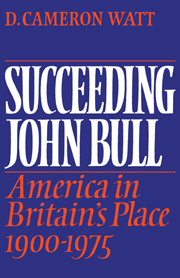Summary
The effect of the virtual paralysis of the Wilson administration in the last year and a half of its life was to accentuate the ever-present fissiparous forces in American foreign-policy-making. Each department of the US government, State, Navy, War, Commerce, and Treasury, developed its own foreign policies; so did the oil lobby, the New York banking confraternity, and American exporters abroad, especially those exporting to Latin America. The Republican victory in the 1920 presidential election was to impose on this maelstrom of activity an element of control, exercised not so much by the President as by the three most powerful members of his Cabinet, Charles Evans Hughes, the Secretary of State, Andrew Mellon at the Treasury and Herbert Hoover at Commerce. They cannot be said to have exercised this control by mutual agreement; it was rather that they had arrived at a common consensus as to who should exercise leadership in public matters. Over a large and important area of US foreign relations they felt leadership should lie with private business and finance. They were determined to see that that leadership should be so exercised, by using their personal and private influence and pressure to see that it was. Industry repaid them by insisting on State Department action in the name of the ‘Open Door’, where foreign governments, especially that of Britain, were felt to be exercising political power to stand in the way business.
- Type
- Chapter
- Information
- Succeeding John BullAmerica in Britain's Place 1900-1975, pp. 40 - 68Publisher: Cambridge University PressPrint publication year: 1984

